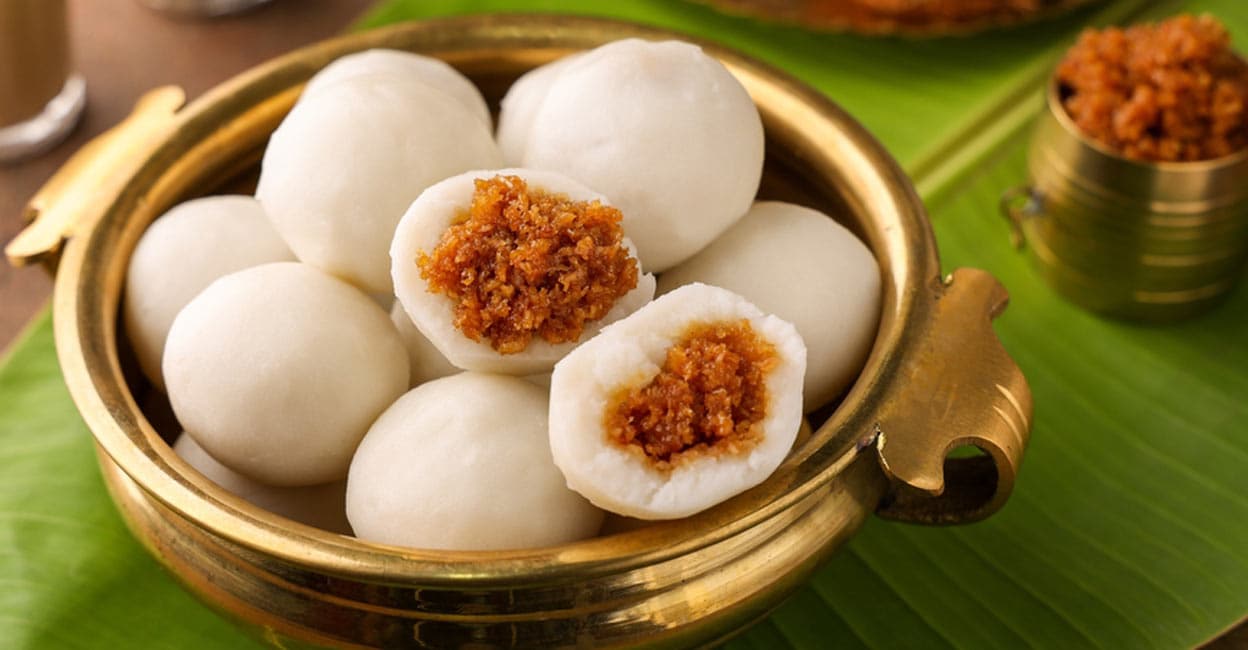The quiet tradition of Kozhukatta Shaniyazhcha, on the eve of Palm Sunday in Kerala’s Christian homes

Mail This Article
In many Christian homes across Kerala, the Saturday before Palm Sunday carries a quiet kind of anticipation. There are no processions, no grand rituals—but in the kitchen, something sacred is taking shape. Soft rice dough, sweet coconut-jaggery filling, steam rising from banana leaf-lined steamers. Kozhukatta Shaniyazhcha—that’s what this day is called in many Syrian Christian families. A Saturday for making kozhukatta. A Saturday remembered through stories, prayer, and the smell of coconut.
Christianity has been part of Kerala’s soul for almost two thousand years. The story goes that St. Thomas the Apostle arrived on the Malabar Coast in 52 AD. Since then, Kerala’s Christian communities—especially the Syrian Christians—have carried their faith through centuries of trade, colonisation, and cultural crosswinds. But even as they held on to the ancient liturgies of the East, they wove local customs, ingredients, and rhythms into their Christian lives. Faith became something they lived, not just in church, but at the dining table, in garden rituals, and in dishes like kozhukatta.
Holy Week, the final stretch of Lent, is a deeply reflective time here. It begins with Palm Sunday and leads into Spy Wednesday (when Judas planned his betrayal), Maundy Thursday (the Last Supper), Good Friday (the crucifixion), and Holy Saturday. But for some families, it’s the Saturday before all this that signals the beginning—when Jesus is believed to have visited the home of Lazarus, Martha, and Mary.
The story, as told by elders and passed along like family recipes, goes like this: When Jesus came to their home, Mary sat by Him, listening. Martha, flustered, rushed to prepare something to serve. In that hurried love, she shaped simple flour dumplings with a sweet filling. That dish, in Kerala’s hands, became kozhukatta.
Another telling says the dumplings were made and shared in celebration after Lazarus was raised from the dead—a humble sweet passed around in joy, marking life restored and hope rekindled.

In many homes, this Saturday is called Kozhukatta Perunal. The dumplings are steamed with quiet reverence. Children are called in to help—sometimes just to shape one or two with clumsy fingers. The dumplings themselves, round and unadorned, are said to carry two meanings: one, as a symbol of Martha’s offering to Christ; the other, as a reminder of the stones hurled at Jesus during His suffering, the sweetness inside pointing to grace that endures even in pain.
This isn’t a widespread Church-declared feast. It doesn’t appear in official calendars. Yet in Thrissur, Ernakulam, Kottayam—across central Kerala—you’ll find this tradition quietly alive. You’ll hear elders reminding the children, “Don’t forget, Saturday is kozhukatta sheni.” You’ll see grandmothers folding dough while murmuring prayers. It’s not loud or elaborate. But it’s intimate. It stays with you.
But kozhukatta doesn’t belong only to this moment or to one community. It has long existed in Kerala’s food culture. It’s made in Hindu homes too, especially as temple offerings and festive treats. During Vinayaka Chaturthi, a near-identical dumpling—modak—is made as a favourite of Lord Ganesha. The ingredients are nearly the same: rice flour, coconut, jaggery. The shape, the process, even the reverence around it—uncannily similar.
Kozhukatta Shaniyazhcha isn’t a festival in the usual sense. No grand meals, no church bells, no community feasts. Just a small, sweet offering, steamed in kitchens where faith is quiet but deeply felt. For something so simple, kozhukatta holds a surprising amount of meaning.
Here’s a classic Kerala-style kozhukatta recipe:
Ingredients
For the dough:
1 cup rice flour (preferably roasted rice flour or idiyappam flour)
1 cup water
1 tsp coconut oil
A pinch of salt
For the filling:
1 cup grated coconut
½ cup jaggery (crumbled or grated)
½ tsp cardamom powder
1 tsp ghee (optional, for extra richness)
Preparation
In a pan, melt the jaggery with a splash of water over low heat until fully dissolved
Add grated coconut and stir well
Let it cook for a few minutes until the mixture thickens slightly and smells rich and sweet
Mix in cardamom powder and ghee (if using)
Take it off the heat and let it cool
Bring 1 cup water to a gentle boil with a pinch of salt and 1 tsp coconut oil
Slowly pour the hot water into the rice flour, stirring constantly with a wooden spoon
Once cool enough to handle, knead into a smooth, soft dough
If it's too dry, sprinkle a little warm water
If too sticky, dust with a bit of rice flour
Grease your palms with a little coconut oil
Pinch off small portions of dough and roll into smooth balls (about lime-sized)
Flatten each ball into a small disc
Place a spoonful of the coconut-jaggery filling in the center, fold gently, and seal the edges—either into a ball or a slightly oval shape
Place the dumplings on banana leaves or an oiled steamer plate
Steam for about 10–12 minutes on medium heat until the dough turns slightly glossy.

